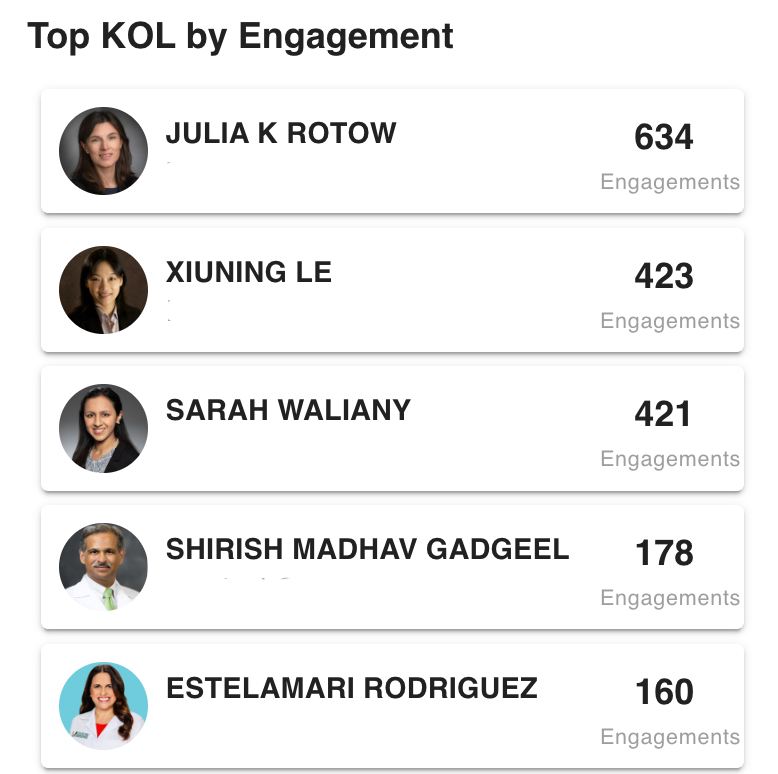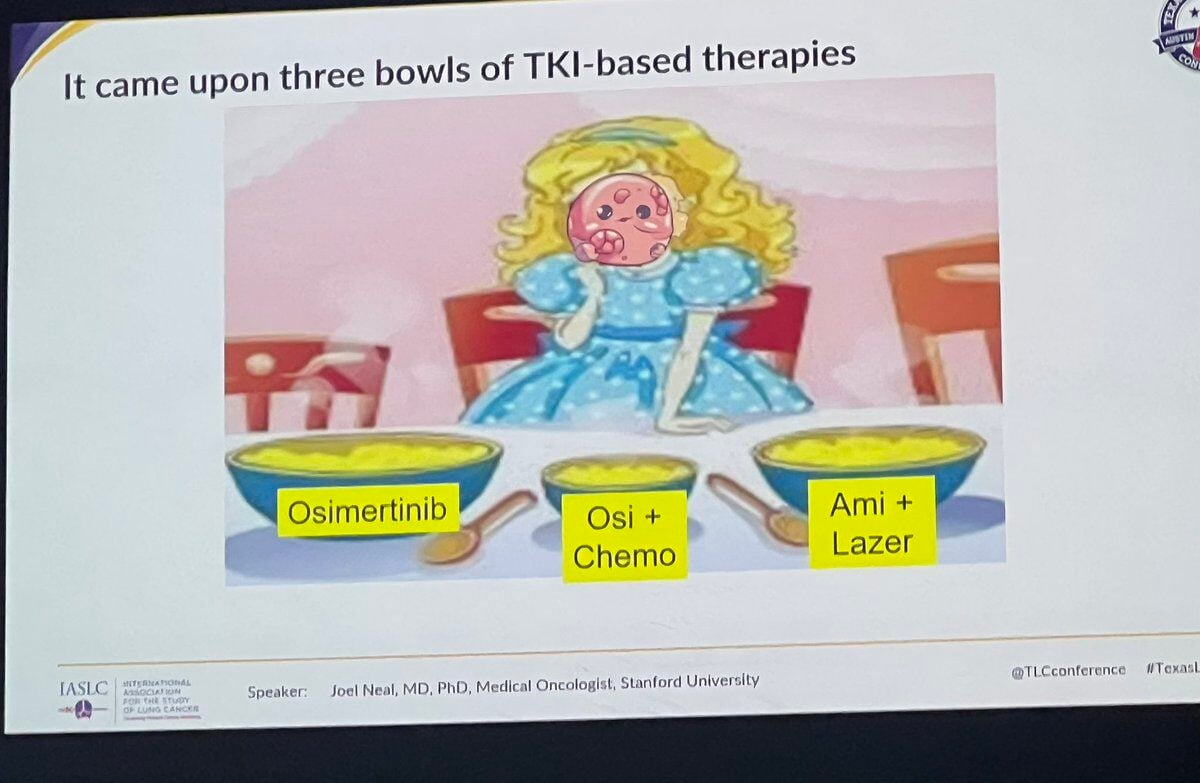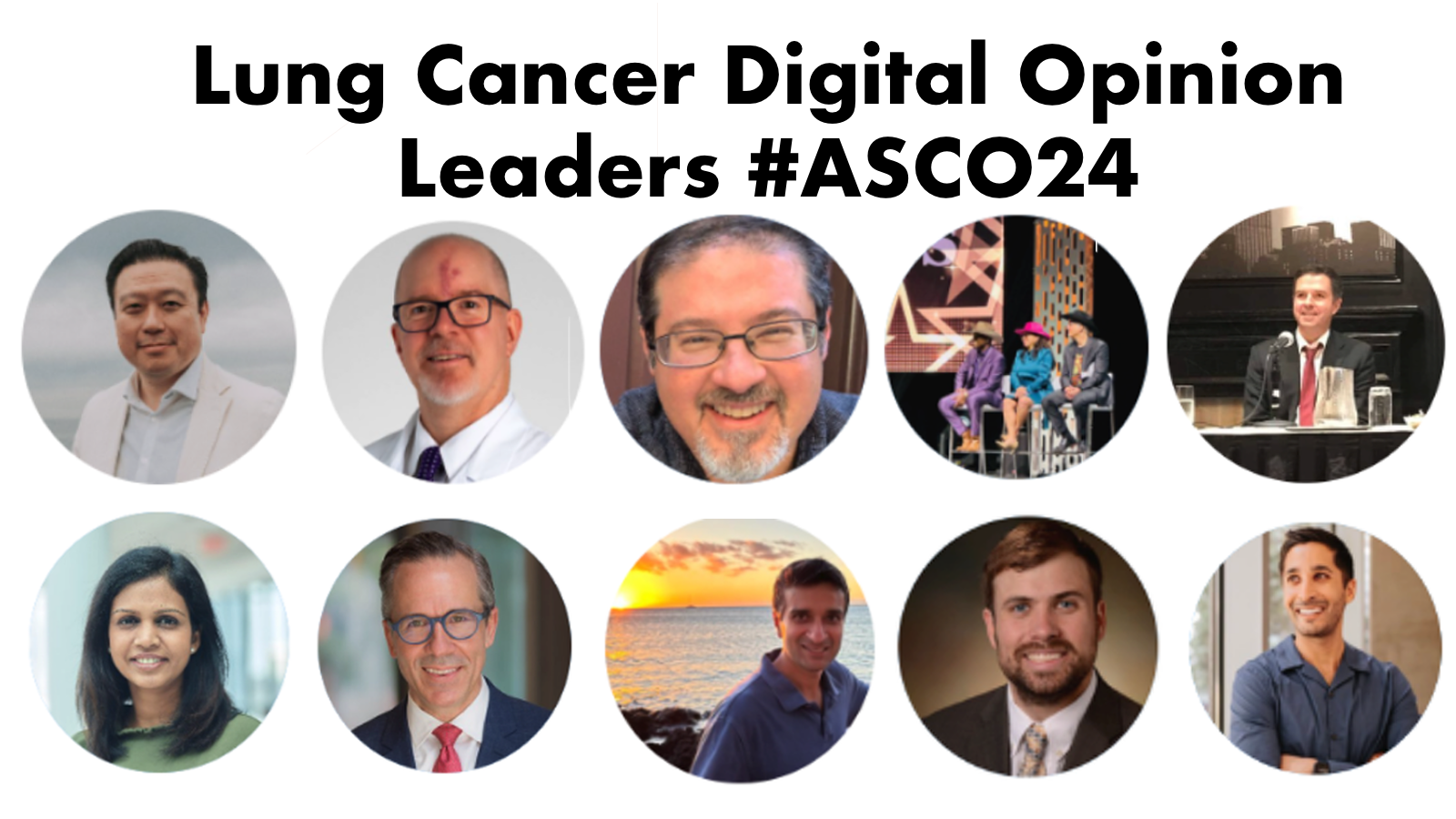4 min read
Lung Cancer KOLs Use Memes to Communicate EGFRmut Treatments
The Role of Memes in Communicating Lung Cancer Treatment Challenges: A Focus on EGFR Mutation Therapy In the realm of healthcare communication,...

Breakthroughs in NSCLC Treatment: Key Insights from #TTLC25
The Targeted Therapies for Lung Cancer (#TTLC25) conference showcased groundbreaking advancements across multiple facets of non-small cell lung cancer (NSCLC) treatment. Experts delved into critical topics, including optimizing treatment sequencing for EGFR-mutated NSCLC, emerging immunotherapies, rare molecular subtypes, and novel therapeutic approaches. Here are the most impactful insights shaping the future of lung cancer care.
Masterful summary of the EGFR landscape, across diverse mutation subtypes, by @LeXiuning at #TTLC25 pic.twitter.com/lYmaP1ooqb
— Geoff Oxnard MD (@geoff_oxnard) February 20, 2025
Dr. Julia Rotow (@JuliaRotow) emphasized that while osimertinib monotherapy remains the standard of care for EGFR+ NSCLC, new data from the FLAURA2 and MARIPOSA trials are challenging existing paradigms. The discussion introduced the concept of "time toxicity," which refers to the often-overlooked burden of intensive treatment regimens on patients' daily lives. Notably, 25-40% of patients never reach second-line therapy, making first-line treatment selection critical.
Bookmark this slide from @JuliaRotow!
— Eric K. Singhi, MD (@lungoncdoc) February 20, 2025
The treatment landscape for EGFR+ mNSCLC is increasingly complex. Shared decision-making is crucial, and how we sequence available regimens matters just as much as the choices themselves. #TTLC25 @IASLC @OncoAlert pic.twitter.com/KtQhQebVVU
Dr. Ana V. Manana (@AnaVManana) explored the potential of oncolytic viruses in combination with immune checkpoint inhibitors, demonstrating promising synergies that are still in early clinical stages.
#TTLC25 🤩Great presentation by @AnaVManana @UCSFCancer on Oncolytic Viruses and Intratumoral Therapies on the horizon for NSLC
— Dr. Estela Rodriguez (@Latinamd) February 21, 2025
👉🏽a lot of work still in pre-clinical stage, but interesting synergy w ICI therapies to watch.
#lcsm pic.twitter.com/6NW4fU7rjB
Additionally, Dr. Justin Gainor (@justingainor) presented emerging oncogene-directed immunotherapies, such as peptide and mRNA vaccines for ALK+ NSCLC, as well as innovative strategies targeting macrophages via CD47 inhibitors.
#TTLC25 Great review by @JustinGainor on emerging TKI+ICI combos, oncogene-directed peptide& mRNA #vaccines to make prior "cold" tumor immunogenic & early data w/ cellular therapies #TTLC25 #lcsm @IASLC pic.twitter.com/XAkW0GjkRz
— Dr. Estela Rodriguez (@Latinamd) February 21, 2025
Dr. Le Xiuning (@LeXiuning) provided valuable insights into EGFR PACC mutations, which constitute approximately 12% of EGFR+ NSCLC cases. Current treatment options show heterogeneous efficacy, with afatinib offering the most promising responses. Ongoing trials, including firmonertinib in first-line and adjuvant settings, aim to refine treatment strategies for these rare variants.
Excellent talk by @LeXiuning on #EGFR #PACC mutations #TTLC25
— Sarah Waliany, MD, MS (@SWaliany) February 20, 2025
🔹PACC = ~12% of EGFR mut in #NSCLC
🔹Existing EGFR TKIs have modest efficacy for PACC. Best responses w/ 2G TKI afatinib in single & compound mut
🔹Ongoing/planned trials eg. #firmonertinib in 1L & adjuvant settings pic.twitter.com/32hsASNTcP
Dr. Tim Yap (from @MDAndersonNews) outlined the growing role of ADCs in NSCLC treatment, focusing on key extracellular targets such as tissue factor, Nectin-4, FRα, CEACAM5, NaPi2B, and ROR2. These ADCs, many of which have received FDA approval in other cancer types, may offer new therapeutic avenues for patients with limited treatment options.
Dr. Tim Yap from @MDAndersonNews breaks down key extracellular ADC targets, many with FDA approvals outside of lung cancer. #TTLC25 @IASLC
— Eric K. Singhi, MD (@lungoncdoc) February 21, 2025
🎯 Tissue factor
🎯 Nectin-4
🎯 FRα
🎯 CEACAM5
🎯 NaPi2B
🎯 ROR2 pic.twitter.com/kqS6FbRujH
Dr. Ferdinandos Skoulidis (@FSkoulidis) stressed the clinical impact of STK11 and KEAP1 mutations. STK11 alterations negatively affect response to single-agent anti-PD-(L)1 therapies, while KEAP1 mutations contribute to resistance against platinum-based chemotherapy. These findings reinforce the growing importance of molecular profiling in treatment selection.
Dr. @FSkoulidis from @MDAndersonNews highlights the clinical impact of STK11 and KEAP1 alterations in treatment:
— Eric K. Singhi, MD (@lungoncdoc) February 21, 2025
🔹 STK11 affects outcomes with single-agent anti-PD-(L)1 therapy.
🔹 KEAP1 drives strong resistance to platinum chemotherapy.#TTLC25 @IASLC pic.twitter.com/5GfmuEaqTo
Dr. Tejas Patil (@TejasPatilMD) discussed risk stratification for ALK+ NSCLC, highlighting molecular predictors of poor outcomes with ALK TKIs. He emphasized the need for personalized approaches, intensification strategies to address drug-tolerant persister cells, and greater focus on quality of life considerations.
Great discussion by @TejasPatilMD on expanding frontiers in #ALK+ NSCLC, including identifying molecular predictors of worse outcomes w/ ALK TKIs, intensification strategies to address drug-tolerant persister cells, and important quality of life considerations #TTLC25 pic.twitter.com/Lnu3KQFvBs
— Sarah Waliany, MD, MS (@SWaliany) February 22, 2025
Dr. Coral Olazagasti (@COlazagasti) and Dr. Narjust Florez (@NarjustFlorezMD) brought attention to the rising incidence of lung cancer in younger patients, particularly women.
#TTLC25 @COlazagasti @SylvesterCancer presents data for rising incidence of #younglungcancer & women w lung cancer-contributing risk factors and molecular characteristics. #lcsm @YoungLungCancer @Florez_Lab pic.twitter.com/QHjBRA3rlB
— Dr. Estela Rodriguez (@Latinamd) February 21, 2025
Their presentations covered key issues such as delayed diagnosis, survivorship challenges, fertility concerns, and financial toxicity, underscoring the need for tailored interventions.
Financial toxicity and Young Lung Cancer
— Narjust Florez, MD, FASCO (@NarjustFlorezMD) February 25, 2025
Extracts from our recent article @YoungLungCancer @Sunonmyhip @ALKPositiveinc @EGFRResisters pic.twitter.com/5KExy9rkcm
One of the most talked-about therapies at #TTLC25 was ivonescimab, an IO/VEGF inhibitor from the HARMONi-2 trial. Dr. Balasz Halmos (@BalazsHalmosMD) sparked debate by presenting the potential of this new therapy while also highlighting existing data gaps that need further exploration.
#TTLC25 Leave it to @BalazsHalmosMD (King of Memes) to present data for next IO/VEGF inhibitors (I.e ivonescimab) to compete for the Crown of 1L NSCLC therapy in the most memorable way. #lcsm pic.twitter.com/55PdyY8TpG
— Dr. Estela Rodriguez (@Latinamd) February 20, 2025
As Dr. Eric Singhi (@lungoncdoc) noted, shared decision-making is more critical than ever in navigating the increasingly complex EGFR+ NSCLC treatment landscape. With rapid advancements in targeted therapy, immunotherapy, and molecular profiling, a patient-centric approach that considers both efficacy and quality of life is essential.
For access to all presentations, visit the IASLC’s Lung Cancer 360 portal: Lung Cancer 360.
Stay tuned for further updates as these evolving therapies continue to shape the future of lung cancer treatment.
Follow the top lung cancer leaders from the recent #ttlc25 meeting 👉https://t.co/pxRNnM3wxT #lcsm
— KOL Pulse AI (@KolPulseAI) February 25, 2025

4 min read
The Role of Memes in Communicating Lung Cancer Treatment Challenges: A Focus on EGFR Mutation Therapy In the realm of healthcare communication,...

by Brian Shields

by Brian Shields The LUNAR trial is a phase 3 clinical trial that evaluated the safety and effectiveness of Tumor Treating Fields (TTFields) therapy...